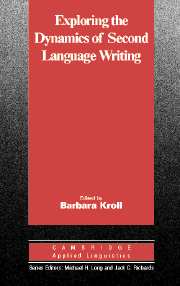Book contents
- Frontmatter
- Contents
- List of contributors
- Acknowledgments
- List of abbreviations used
- Series editors' preface
- Introduction: Teaching the next generation of second language writers
- I EXPLORING THE FIELD OF SECOND LANGUAGE WRITING
- II EXPLORING THE VOICES OF KEY STAKEHOLDERS:TEACHERS AND STUDENTS
- III EXPLORING WRITERS' FINISHED TEXTS
- Chapter 5 Responding to writing
- Chapter 6 Grammar and the ESL writing class
- Chapter 7 Writing teachers as assessors of writing
- IV EXPLORING CONTEXTUALITIES OF TEXTS
- V EXPLORING TECHNOLOGY
- EPILOGUE: EXPLORING OURSELVES
- Index
Chapter 7 - Writing teachers as assessors of writing
Published online by Cambridge University Press: 05 October 2012
- Frontmatter
- Contents
- List of contributors
- Acknowledgments
- List of abbreviations used
- Series editors' preface
- Introduction: Teaching the next generation of second language writers
- I EXPLORING THE FIELD OF SECOND LANGUAGE WRITING
- II EXPLORING THE VOICES OF KEY STAKEHOLDERS:TEACHERS AND STUDENTS
- III EXPLORING WRITERS' FINISHED TEXTS
- Chapter 5 Responding to writing
- Chapter 6 Grammar and the ESL writing class
- Chapter 7 Writing teachers as assessors of writing
- IV EXPLORING CONTEXTUALITIES OF TEXTS
- V EXPLORING TECHNOLOGY
- EPILOGUE: EXPLORING OURSELVES
- Index
Summary
Many teachers feel that assessment is not their concern, that their job is to teach well, and that assessment is something to be taken care of by someone else – by a special person within their school who is responsible for testing or by external, invisible means (often through large-scale tests devised and administered by an agency outside of their own institution). But if teachers accept responsibility for the progress of the people they teach, and if they want to ensure that those they teach will be judged fairly (and all teachers do!), they must have some involvement with evaluation. Teachers must know enough about assessment practices to be able to look at the assessments being brought into their programs, or being taken externally by their students, and evaluate them. From this perspective, assessment is every teacher's job.
In this chapter, I first provide a short overview of some key aspects of assessment in general and follow with a focused discussion of the most critical issues that writing teachers need to be aware of in a variety of situations they are likely to face – when they plan writing tests for their own students, take part in a school-wide writing assessment, participate in decisions about what writing test to use for a specific purpose, or talk to parents about the meaning and implications of tests their children are taking. Without such information, it is very difficult for teachers to make informed and knowledgeable decisions about a very critical component in the full picture of teaching writing.
- Type
- Chapter
- Information
- Exploring the Dynamics of Second Language Writing , pp. 162 - 190Publisher: Cambridge University PressPrint publication year: 2003
- 22
- Cited by



